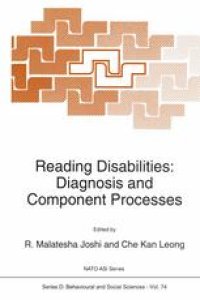
Ebook: Reading Disabilities: Diagnosis and Component Processes
- Tags: Interdisciplinary Studies, Psycholinguistics
- Series: NATO ASI Series 74
- Year: 1993
- Publisher: Springer Netherlands
- Edition: 1
- Language: English
- pdf
The present volume is based on the proceedings of the Advanced Study Institute (ASI) sponsored by the North Atlantic Treaty Organization (NATO). The Institute was conducted at the beautiful Chateau de Bonas, near Toulouse, France in October, 1991. A number of scholars from different countries participated in the two-week institute on differential diagnosis and treatments of reading and writing problems. The accepted papers for this volume are divided into three sections: (a) Differential diagnosis of reading disabilities; (b) Access to language-related component processes; and (c) Reading/spelling strategies. The other papers appear in a companion volume: Developmental and Acquired Dyslexia: Neuropsychological and Neurolinguistic Perspectives, also coedited by Joshi and Leong and published by Kluwer Academic Publishers. Several people and organizations have helped us in this endeavor and their assistance is gratefully acknowledged. Our special thanks are due to: the Scientific Affairs Division of NATO for providing the major portion of the financial support; Dr. L. V. da Cunha of NATO and Dr. THo Kester and Mrs. Barbara Kester of the International Transfer of Science and Technology (ITST) for their help and support of the various aspects of the institute; Mr. Charles Stockman and the entire staff of the Chateau de Bonas for making our stay a pleasant one by helping us to run the Institute smoothly. We also wish to thank our reviewers and the following people for other assistance: Christi Martin, and Xi-wu Fang.
This edited volume on diagnosis and component processes of reading disabilities is based on the NATO Advanced Study Institute held in late 1991. The book, consisting of 18 chapters from cognitive psychologists and neuropsychologists from different countries, is divided into three parts. Part I discusses current issues of differential diagnosis including the role of intelligence test scores and listening comprehension tests, and the use of individual profiles with different criteria across developmental and reading and writing skills. Part II examines language-related component processes in reading disabilities. This explication includes different processing models; phonemic awareness and phonological awareness; and the mapping of phonology and alphabetic orthography. Part III provides some answers to such relevant questions as the way readers/spellers access lexical knowledge and whether poor readers/spellers use different strategies. The data for this part derive from children speaking English, Danish, German, Dutch and Greek and converge on the importance of phonological processing in reading disabilities. These studies and the others attempt to answer the challenge of differential diagnosis. Researchers and senior students will find the volume a vital and stimulating addition to their library.
(ABSTRACT)
What is the nature of differential diagnosis of reading disabilities? Are intelligence test scores relevant? How important is pseudoword reading? What about listening comprehension? How best can clinicians supplement group results with individual developmental profiles of reading and writing skills? How do different models of language-related components within a cognitive-developmental framework explain individual differences in reading disabilities? What is the nature of phonemic awareness, phonological awareness within the broad context of phonological processing in children with reading disabilities? What are the differential strategies of poor readers/spellers? These are some of the questions that the international group of contributors attempt to answer from their different research programs.